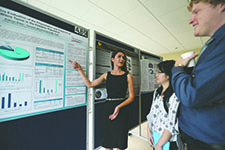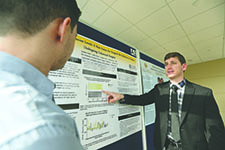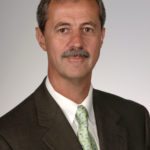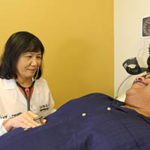 The best doctors have a “spirit of inquiry” – the ability to seek solutions to medicine’s unanswered questions: Why are so many of my patients getting the flu this year compared to last? Why does one treatment for diabetes work for one patient but not for all? What’s a better way to identify patients at risk for heart disease?
The best doctors have a “spirit of inquiry” – the ability to seek solutions to medicine’s unanswered questions: Why are so many of my patients getting the flu this year compared to last? Why does one treatment for diabetes work for one patient but not for all? What’s a better way to identify patients at risk for heart disease?
At the College of Medicine, instilling that spirit into our students is a top priority. That’s why we are unique nationally in requiring every student to do a two-year research project where they make new scientific discoveries in a subject about which they are passionate. We call this course FIRE – Focused Inquiry and Research Experience – and this part of our curriculum showcases the future. It highlights how students are thinking beyond today, are creating the practice of medicine, and are answering the questions we need for tomorrow.
Past FIRE projects show the diversity of scientific questions our students possess. Here are just a few examples:
Does everyone with lower back pain need an MRI? Can taking sesame oil decrease inflammation in patients with rheumatoid arthritis? Is there a more reliable, easier way to determine if adolescent athletes have suffered a concussion? Does congenital heart disease in children impact their emotional intelligence?
The goal of the FIRE module is to help students appreciate the scientific method, to have experience conducting scientific experiments, and to encourage them to ask “why” during their clinical careers. Some might actually do lab research while caring for patients, but those who don’t still need training to analyze patterns and symptoms to discover better ways to provide care.
Many of our students come to medical school having done scientific research. Those who haven’t can be nervous at the thought of coming up with a scientific hypothesis and testing it. However, their FIRE projects give them opportunity to investigate basic science concepts as well as topics with a social or historical focus.
Some students have looked at health disparities among ethnic and economic groups. Others have studied depression and burnout. Last year, M.D. student Nathan Esplin researched whether pre-Columbian residents of Peru suffered from tuberculosis. He worked with Dr. Marla Toyne of UCF’s College of Sciences and graduate anthropology students. By examining skeletal remains of people from the Eastern Highlands of Peru, he found evidence that tuberculosis might have had a significant impact on the health of these early people.
This year, first- and second-year M.D. students will present their research posters and oral presentations at the aptly named “FIRED Up for Research” conference Feb. 23 from 8 a.m. to 6 p.m. at the medical school. The event is open to the public; physicians can even get Continuing Medical Education credits for attending.
So, stop by, learn something new, and see why so many UCF medical students publish or present their research at the regional, state and national level – before ever graduating.




